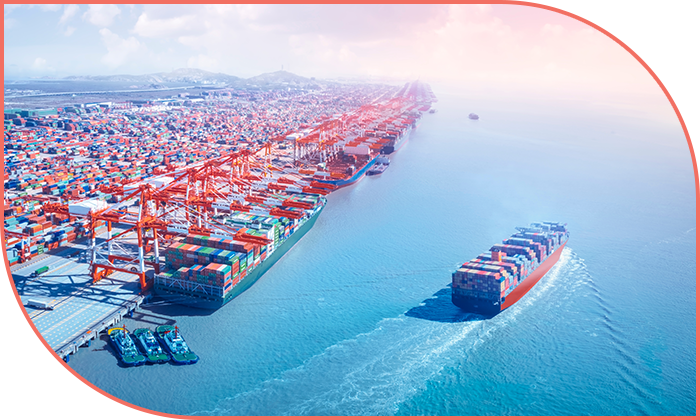Sea Freight From Dubai To UK
What is ocean freight?
Ocean freight is the process of transporting large quantities of goods by sea. It is one of the oldest forms of transportation used in trade. Sea freight remains the most common way for businesses to move large volumes of goods internationally, especially between widely separated countries like Dubai and the UK.
LCL (less than container load)
LCL is used when the shipper does not have enough goods to fill an entire container. Instead, cargo from multiple shippers is consolidated into a single container.
FCL (full container load)
FCL shipping is where one shipper exclusively uses a single container for transporting cargo.
Get The Best Dubai Sea Freight Rates Today
Easily compare rates from top ocean freight carriers. Save time and money on your next shipment.
How does sea freight work in Dubai?
Documentation, including bills of lading, export and import forms, and packing lists, is prepared to comply with both UAE and UK customs regulations. In Dubai, major ports like Jebel Ali and Khalifa Port facilitate the majority of the sea freight movements.
Jebel Ali, for example, is the largest and busiest port in the Middle East. It is equipped to handle vast amounts of cargo and excellent sea connectivity, with 11,000 vessel calls per annum.
Khalifa Port also serves as a critical hub, especially for Abu Dhabi's container traffic. Once the goods are loaded and the vessel sails, transit times can vary. The journey from Dubai to major UK ports can take approximately 20-40 days, depending on the vessel and route.
Upon arrival in the UK, the containers are offloaded, and goods undergo customs clearance. The process involves paying the necessary duties and taxes, after which the goods are released for onward distribution to the customer’s destination.

How much does shipping cost from Dubai?
From the types of goods and their freight classification to insurance costs, customs duties, and VAT, here’s a breakdown based on the essential components of sea freight shipping:
1. Import Duty (Customs and Excise Duty)
Import duties are taxes imposed by customs on sea freight from Dubai. The rate of duty depends on the type of goods and their value.
The duty is calculated as a percentage of the cargo’s total value, including the cost of freight and insurance. The UK Trade Tariff tool can be used to determine specific duty rates for different types of goods.
2. Port of Origin and Destination
Shipping costs can also vary depending on the port of origin in Dubai and the selected UK destination.
Major ports in Dubai include Jebel Ali and Mina Rashid. In the UK, popular entry ports for sea freight from Dubai include Felixstowe, Liverpool, and London Gateway.
Charges will vary based on the distance between these ports and the logistics of entering or exiting them.
3. Goods
Sea shipping from Dubai can cost more if you’re transporting goods with unique handling and storage requirements (e.g. hazardous materials, perishable goods).
4. VAT
Value Added Tax (VAT) on imported goods in the UK is currently set at 20%.
VAT is calculated on the total cost of the goods, including the purchase price, shipping costs, and any import duty paid. Certain goods, such as children's clothing and books, are zero-rated, meaning they are exempt from VAT.
5. Customs Clearance
Customs clearance fees include the costs of processing sea freight from Dubai. Such costs may include preparing and submitting documents, calculating duties and taxes, and facilitating the release of the goods.
6. Marine insurance
Marine insurance covers loss or damage to cargo while in transit.
The cost is typically a small percentage of the cargo’s declared value and depends on the risk associated with the type of goods and route taken to transport sea freight from Dubai to UK.
7. Freight Class
The National Motor Freight Classification (NMFC) determines freight class and affects shipping costs by classifying goods based on their transportability. The classification considers factors like stowability, handling, and liability.
If your sea shipping from Dubai contains goods that are dense, easy to handle and stow, they will generally have lower freight classes (and lower shipping costs compared to bulky, more fragile items).
Important documents used in sea freight from Dubai
1. Bill of Lading (B/L)
The Bill of Lading is a fundamental document in all sea freight shipments. Issued by the carrier to the shipper, it serves as a receipt, a contract between the shipper and the carrier, and a title document for any goods.
It details the type, quantity, and destination of the goods being shipped and is used to claim the cargo at the recipient port. The B/L must be accurate to avoid customs delays.
2. Commodity Code
Commodity codes classify goods for import and export. They ensure that the right tariffs are applied and that the goods comply with local laws and regulations.
The UK uses a ten-digit commodity code system to align with international trade standards and the globally-used Harmonized System.
To determine the correct import duties and prepare for inspections, use the UK’s online commodity code service.
3. Import Licence
An import licence may be required for controlled goods such as firearms, agricultural products, and pharmaceuticals. The document authorises the importation of goods that would otherwise be restricted or prohibited.
Some goods cannot be exported from Dubai, including the following list released by Dubai customs:
- Any narcotic drugs
- Gambling tools, machinery and devices of all kinds
- Nylon fishing nets
- Live swine
- Used, reconditioned and inlaid tyres
- Radiation and nuclear fallout contaminated substances
- Items that contradict the Islamic faith and public morals
- Paan and betel leaves
4. EORI Number
UK customs uses the Economic Operator Registration and Identification (EORI) number to monitor and record import and export declarations.
Companies need to register for an EORI number to move goods between Dubai and the UK or face potential delays and increased costs.
Shipping Made Simple: Compare Quotes Now
Quickly compare ocean freight quotes from multiple carriers. Get the most competitive price for your shipment from Dubai.
Dubai to UK sea freight time
Port efficiency
Both the departure and arrival ports play a significant role in the total shipping time. Key ports involved in transporting sea freight from Dubai to UK include Jebel Ali, Southampton, and Felixstowe.
These ports' efficiency in cargo handling can significantly influence overall transit times. For instance, the Port of Southampton is known for its substantial capacity, which can help minimise delay.
Customs delays
Customs processes both in Dubai and the UK can delay shipments, especially if the necessary documents are not prepared in advance.


Weather conditions
Seasonal weather variations, particularly in the Mediterranean and Atlantic, can impact sea shipping from Dubai.
Maritime traffic
Traffic congestion in critical points like the Suez Canal can lead to significant delays. The volume of traffic typically increases during certain periods of the year, and certain events may affect shipping times.
Top shipping ports in Dubai
Mina Rashid Port
Al Hamriya Port
The Best Rate For Your Ocean Freight
Access real-time quotes from leading freight providers. Choose the best ocean shipping option for your business.